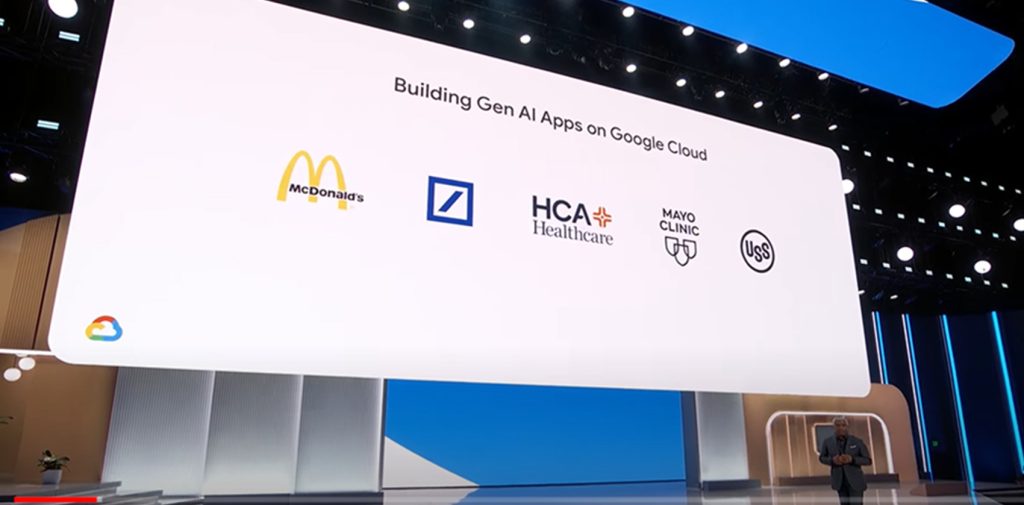Google Cloud’s rapid investment and expansion during the last five years are reflected in many ways at this year’s Google Cloud Next in Las Vegas, and not just in its growing revenue run-rate. One of the most visible signs is the highly diverse industries represented during keynotes and breakout sessions. Given Google Cloud’s progress in cementing its enterprise presence and developing enterprise-ready solutions during the last five years, it’s safe to say that this year’s crop of represented industries is the most expansive that Google has ever hosted at its annual event.
The majority of represented Google customers, regardless of industry, were understandably focused on Generative AI (GenAI), which is clearly opening up more enterprise opportunities for Google Cloud and its partners. However, customers did not limit their discussions to how to utilize Google’s Vertex AI platform or its Gemini GenAI solution.

Google Cloud CEO Thomas Kurian shows a range of customer logos across vertical industries during his Google Cloud Next ’24 keynote.
Some pointed to Google’s expanding set of features in BigQuery, Google Workspace, and its developer tools as providing a fully realized suite of industry capabilities that can scale on the Google Cloud Platform. Meanwhile, others pointed to the efficiencies and benefits they aim to achieve by implementing GenAI more broadly across their organizations.
(Read: New Jersey’s largest hospital chain benchmarks quality care on GCP’s data analytics platform)
“Our work with Generative AI has been focused on three key pillars: enabling business growth, enhancing client experience, and improving developer productivity,” Goldman Sachs Chairman and CEO David Solomon told attendees via video during this week’s keynote. “We want to be thoughtful with how we approach and harness this technology.”
Uber CEO Dara Khosrowshahi told keynote attendees that he is most excited about GenAI’s impact on employee and developer productivity for “a stronger and more empowered workplace.” The ridesharing and delivery company is leveraging Gemini for Google Workspace to cut down on repetitive tasks which “frees up developers’ time for higher-value work, frees up agency spending, and enhances employee retention,” he said. Uber also uses Google’s AI platform to build its own AI agents for its support teams.
In another event session, a global real estate developer said GenAI is more than just the newest tech trend and that Google and its partners give his company flexibility to iterate on GenAI solutions continuously. “This is not an evolution of a business model. This is a massive redefinition of a business model – beyond that, I think it’s an opportunity to reinvent,” he said. “What we’re doing [with GenAI] is sculpting with clay, not stone, and it will move and pivot in different forms as we move forward.”
Customers from other industries relayed what it takes to get a GenAI project off the starting line – from generating board-level buy-in, to aligning business and tech goals, ensuring proper governance and stakeholder involvement, and enabling transparency among employees so they can see how GenAI can benefit them.
Sherri Zink, SVP ad Chief Data & Engagement Officer at Blue Cross Blue Shield of Tennessee, told one breakout audience that her team made all those efforts, and collected more than two dozen suggested GenAI use cases from various business leaders, selecting and advancing targeted ones focused on software coding, marketing content, and customer service for further consideration. Zink’s team also gives the board and leadership regular quarterly updates about their GenAI progress and next phases. “Make sure your leadership team and board of directors are on board with whatever your strategy is,” she said.
Josh Weiss, VP of Global Customer Products and Platform at IHG Hotels & Resorts, said his company has selected an externally facing virtual travel planner as its first GenAI use case. Travelers are becoming more sophisticated in selecting leisure activities and want full travel experiences. “They know how they want to feel when they travel, but they may not know where they want to go,” Weiss said.
IHG is still in the planning stages for its GenAI project, but the company has already migrated all of the necessary data to Google BigQuery as a foundational element of its GenAI-powered travel planner. “All that being in one place is a really good starting point,” he said.
Google Cloud may trail behind other hyperscalers in terms of cloud revenue. Nonetheless, it would be tough to argue that this year’s Google Cloud Next is anything less than an affirmation that it is in the running for dominance – as evidenced by the featured marquee clients, the complexity of the issues that Google Cloud’s solutions are solving, and the strong and growing diversity of industries it serves. It also demonstrates how critical scalable cloud architectures will be for every enterprise’s future with GenAI, regardless of their vertical strengths.
As a leading Google Partner with more than a decade of collaboration with enterprises, we bring together engineering and technology expertise with practical hands-on Google experience, applying AI solutions to complex business challenges. Learn more about how we leverage our seven specializations, 50+ Google Cloud Partner Expertise designations, and more than 1,500 certifications to accelerate scalable transformation.
Author’s Profile
John Madden
Global Thought Leadership Marketing Lead







